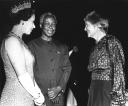 Press coverage of the death of Amina Chifupa – photo Issa Michuzi
Press coverage of the death of Amina Chifupa – photo Issa Michuzi
The death of Amina Chifupa on 26th June 2007 caused a large outpouring of grief in the press and among ordinary Tanzanians. Aged only 26 and a Special Seats MP representing the ruling CCM’s youth wing, Umoja wa Vijana, Amina was something of a celebrity and her colourful life had been closely followed in the media.
Amina died some days after being admitted to the Lugalo Military Hospital in Dar es Salaam from what was described as complications from diabetes and malaria, although some speculation surrounded the exact cause of her death.
Thousands of people from all walks of life gathered at the last rites ceremony in Dar es Salaam, including veteran politician Mzee Rashid Mfaume Kawawa, the Chief Sheikh, Mufti Shaaban Simba, as well as musicians and media celebrities.
President Jakaya Kikwete described Amina as a fearless girl who staunchly stood for the truth. ‘Many of us will remember Amina for her contribution to debate in Parliament and elsewhere in society, notably among the youth. She was strong, creative and always ready to stand for the welfare of the youth and the nation at large’
In an unprecedented move, the National Assembly was adjourned for the whole day and the Speaker announced that he would be leading a delegation of more than 30 MPs from Dodoma to Dar es Salaam for the last rites, and later to the burial at Amina’s mother’s home village of Lupemba Village, Njombe District in Iringa Region
In her remarks, Special Seats Representative Zahara Ali Hamad (CUF) said the death had robbed Tanzania of a fully dedicated leader who during her short tenure in the public service did a lot for the nation.
‘Most of the legislators fear to speak the truth, particularly when it comes to drug abuse and trafficking, but Amina feared nobody. The government should honour her by making sure that it fights drug trafficking even more vigorously’ he noted.
Amina was born on May 20, 1981 and attended primary school in Mwanza. She completed her schooling in Dar-es-Salaam in 2001. Soon after that, she worked with the Dar es Salaam-based Radio Clouds FM as a broadcaster. She held the post until she ventured into politics in 2005 through the CCM youth wing.

 Joan Wicken with the Queen and the late President Nyerere
Joan Wicken with the Queen and the late President Nyerere